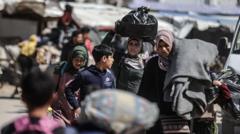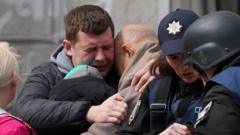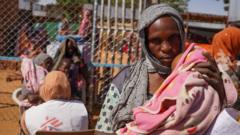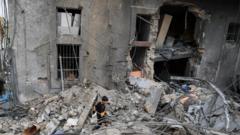The International Committee of the Red Cross reports a catastrophic humanitarian crisis in Gaza, with widespread devastation and a staggering human toll.
Gaza: Humanitarian Crisis Worsens as Death Toll Rises Amid Ongoing Conflict

Gaza: Humanitarian Crisis Worsens as Death Toll Rises Amid Ongoing Conflict
ICRC Chief Declares Gaza a "Cursed Landscape" as Violence Escalates
Gaza has been declared a "cursed landscape" by Mirjana Spoljaric, the head of the International Committee of the Red Cross (ICRC), amid the continuous Israeli military campaign that began last month. The Red Cross has stated that more than 1,500 lives have been lost, with almost 400,000 residents forced from their homes since hostilities resumed in March. On the same day as Ms. Spoljaric's alarming statement, the United Nations human rights office warned that Israel's military strategies posed serious threats to the viability of Palestinian life in the region.
The ICRC, tasked with enforcing the Geneva Conventions—which set international laws governing warfare—has rarely spoken publicly about the violations it observes during conflicts. However, Ms. Spoljaric, citing an "extreme hollowing out" of these laws, has voiced serious concern about the humanitarian impact. The latest reports from Gaza indicate that Israeli airstrikes have predominantly affected women and children, highlighting the dire consequences of military operations on civilians.
Despite Israeli claims that their military actions comply with international law, the cumulative effects of bombings and blockades—restricting supplies of food, medicine, and other essential goods—signal a grim reality for Gaza. As the humanitarian crisis deepens, Israeli officials assert that their military objectives aim to pressure Hamas into releasing hostages captured during the initial outbreak of violence on 7 October 2023.
The UN has echoed these concerns, with multiple officials expressing alarm over the deteriorating living conditions for Palestinians. Recent airstrikes that targeted designated safe zones, including refugee tents, have intensified fears of widespread tragedy. As international leaders call for accountability and urge for a cessation of hostilities, the ongoing conflict garners condemnation for what many perceive as violations of human rights and war crimes.
Emphasizing the necessity of adherence to the Geneva Conventions, Ms. Spoljaric has advocated for an immediate ceasefire. She reminds the global community that the rules of warfare exist to protect civilians and ensure humane treatment of all persons during conflict. The ICRC argues that living by these principles can pave the way for a sustainable peace, cautioning against a dangerous precedent where violations become normalized in warfare.
As the situation in Gaza escalates, the haunting specter of suffering looms large, with implications that will linger for generations to come. The Israeli military response, initially sparked by the devastating events of 7 October, has drawn sharp criticism, with the human cost growing alarmingly high. As debates about ethics in warfare heat up, the global audience watches and waits.



















